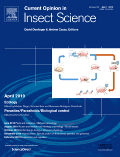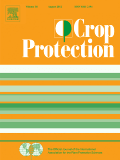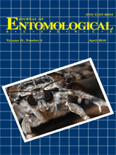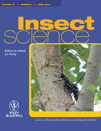
JOURNAL OF PEST SCIENCE
Scope & Guideline
Advancing pest management through innovative research.
Introduction
Aims and Scopes
- Integrated Pest Management (IPM):
The journal promotes research on IPM strategies that combine biological, cultural, physical, and chemical tools to manage pest populations sustainably, minimizing environmental impact. - Biological Control Mechanisms:
Research on natural enemies of pests, including predators, parasitoids, and pathogens, is a core focus, highlighting their role in pest management and ecosystem health. - Pest Resistance Mechanisms:
The journal addresses the mechanisms of resistance in pests to various control agents, including insecticides and biopesticides, and studies the ecological and evolutionary implications. - Chemical Ecology and Semiochemicals:
Studies exploring the chemical interactions between plants and pests, including the use of plant-derived compounds for pest management, are emphasized. - Genetic and Genomic Approaches:
Research utilizing genetic and genomic technologies to understand pest biology, resistance mechanisms, and the development of novel pest control methods is a significant area of focus. - Climate Change and Pest Dynamics:
Investigations into how climate change impacts pest populations, their interactions with crops, and the effectiveness of management strategies are increasingly relevant.
Trending and Emerging
- RNA Interference (RNAi) Applications:
The use of RNAi technology for pest control is gaining traction, with studies focusing on its potential for developing targeted pest management strategies that minimize harm to non-target species. - Microbial Biocontrol Agents:
Research into the use of entomopathogenic fungi, bacteria, and other microbes as biological control agents is on the rise, highlighting their efficacy in integrated pest management. - Ecosystem Services in Pest Management:
Studies exploring the role of biodiversity and ecosystem services in pest suppression are emerging, emphasizing the importance of maintaining ecological balance for sustainable pest control. - Climate Change Impacts on Pest Dynamics:
There is increasing attention on how climate change affects pest behavior, distribution, and management strategies, indicating a need for adaptive pest management practices. - Innovative Monitoring Techniques:
The development and application of advanced monitoring techniques, including remote sensing and citizen science, are trending as effective methods for pest surveillance and management.
Declining or Waning
- Traditional Chemical Pesticides:
Research focusing solely on traditional chemical pesticides is declining as the field shifts toward more integrated and sustainable approaches. The emphasis is moving towards minimizing chemical inputs in favor of biological and ecological strategies. - Single-Species Focus Studies:
There is a noticeable decrease in studies that examine pest management strategies for single pest species without considering ecosystem interactions. The trend is now leaning towards multi-species approaches and the ecological impacts of management practices. - Laboratory-Only Studies:
Research that solely relies on laboratory conditions without field validation is waning. The journal increasingly favors studies that incorporate field trials to assess the practical applicability of pest management strategies.
Similar Journals

Current Opinion in Insect Science
Transforming Perspectives in Insect ScienceCurrent Opinion in Insect Science is a leading academic journal published by ELSEVIER, dedicated to advancing understanding in the field of insect science. With an impressive impact factor reflected in its top quartile rankings (Q1) within both Ecology, Evolution, Behavior and Systematics and Insect Science, the journal holds a prominent position, ranking 3rd out of 181 journals in Insect Science and 35th out of 721 in Ecology-related fields according to Scopus for 2023. Since its inception in 2014, the journal has provided a dynamic platform for researchers, professionals, and students to explore and share cutting-edge developments and insights, targeting crucial topics in insect biology, ecology, and systematics. Although there are no open access options available, Current Opinion in Insect Science remains an essential resource for those looking to stay at the forefront of their research or academic interests.

Crop Protection
Exploring cutting-edge strategies in crop protection.Crop Protection is a leading academic journal in the field of Agronomy and Crop Science, published by Elsevier Science Ltd, and recognized for its high impact demonstrated by an impressive Q1 quartile ranking in 2023. With its ISSN 0261-2194 and E-ISSN 1873-6904, this esteemed publication has been a crucial source of research since its inception in 1982, continuing to provide valuable insights and advancements in crop protection strategies through 2024. The journal serves a diverse audience, including researchers, professionals, and students, eager to explore pioneering findings in pest management, herbicide development, and sustainable agricultural practices. While the journal does not offer open access options, its rigorous peer-review process ensures the highest quality of scholarly articles that contribute significantly to the agricultural and biological sciences, maintaining its respected position with a Scopus rank of #63 out of 406 in its category, placing it in the 84th percentile. Engaging with Crop Protection not only enriches knowledge but also promotes innovative solutions for global agricultural challenges.

Frontiers in Insect Science
Pioneering Research in Insect Ecology and BeyondFrontiers in Insect Science is a pioneering open-access journal dedicated to the advancement of knowledge in the field of insect science. Published by FRONTIERS MEDIA SA in Switzerland, this journal serves as a vital platform for researchers, professionals, and students to disseminate high-quality, peer-reviewed research spanning diverse topics within insect biology, ecology, and pest management. Since its establishment in 2021, the journal has gained recognition, ranking in the Q2 category of Insect Science with a Scopus ranking of #92 out of 181 in the field. With a commitment to promoting open access and collaboration, Frontiers in Insect Science is instrumental in fostering innovative research and practical applications essential for combating biodiversity loss and enhancing agricultural sustainability. As a freely accessible resource, it invites contributions that impact both fundamental and applied insect research, connecting a global network of scholars eager to explore the fascinating world of insects.

BULLETIN OF INSECTOLOGY
Pioneering Discoveries in Insect ResearchBULLETIN OF INSECTOLOGY is a prominent academic journal published by ALMA MATER STUDIORUM, UNIV BOLOGNA, Italy, specializing in the field of Insect Science. The journal, with ISSN 1721-8861 and E-ISSN 2283-0332, has established itself as a vital resource for researchers and professionals interested in the diverse aspects of entomology and its applications. It ranks in the Q2 category for Insect Science as of 2023, placing it among the top journals in its field with a Scopus rank of 79 out of 181. The BULLETIN OF INSECTOLOGY is committed to disseminating high-quality research and innovative studies, facilitating open dialogue and collaboration among scientists. As an essential platform for sharing groundbreaking findings, it contributes significantly to the body of knowledge in agricultural and biological sciences, making it an invaluable asset for scholars and practitioners alike. With coverage from 2002 to 2024, this journal continues to foster advancements in entomological research and its importance in tackling environmental challenges.

Persian Journal of Acarology
Unlocking the secrets of the microscopic world.The Persian Journal of Acarology, published by the Acariology Society of Iran, stands as a pivotal resource in the fields of Animal Science, Zoology, and Insect Science. Established in 2012 as an open-access platform, this journal provides researchers and academics with a rich repository of peer-reviewed articles focused on the study of acarology, encompassing both basic and applied research. With its current ranking in the Q3 category and significant Scopus rankings in related fields, the journal fosters scholarly communication among professionals, facilitating the advancement of acarology globally. The journal’s commitment to open access ensures that valuable research is available to a wide audience, supporting both emerging and established scientists in their pursuit of knowledge. With contributions from distinguished authors and a steady trajectory of growth, the Persian Journal of Acarology is a vital tool for those invested in the future of acarological studies and applied entomology.

PHYTOPROTECTION
Advancing the Science of Plant ProtectionPHYTOPROTECTION is a distinguished academic journal dedicated to the field of plant protection, published by the Quebec Society for the Protection of Plants. With an ISSN of 0031-9511 and an E-ISSN of 1710-1603, it serves as a platform for researchers, professionals, and students focused on the latest advances in plant protection methodologies, pest management, and sustainable agricultural practices. Although the journal's coverage in Scopus has been discontinued since 2010, its past publications encompass a wealth of valuable research from 1993 to 1994 and from 1996 to 2010, making it a crucial resource for those investigating plant health. The journal firmly positions itself as a fundamental contribution to the advancement of agricultural science, emphasizing research that addresses both contemporary challenges and future trends in the protection of plant resources.

JOURNAL OF ENTOMOLOGICAL SCIENCE
Exploring the Frontiers of Insect ScienceJOURNAL OF ENTOMOLOGICAL SCIENCE, published by the Georgia Entomological Society Inc, is a crucial resource in the field of insect science and ecology. With a rich history since its inception in 1993, the journal provides a platform for innovative research and comprehensive reviews addressing various aspects of entomology. Although not an open-access journal, it is highly regarded within its community, holding a Q3 ranking in Agronomy and Crop Science, Ecology, Evolution, Behavior and Systematics, and Insect Science as of 2023. Each issue promises to contribute valuable insights to professionals, researchers, and students alike, making it an essential publication for those looking to stay abreast of developments in entomological studies. The journal's editorial commitment ensures that it remains at the forefront of entomological research through rigorous peer reviews and a dedication to scholarly excellence.

EXPERIMENTAL AND APPLIED ACAROLOGY
Pioneering Insights into Ecology and Insect ScienceEXPERIMENTAL AND APPLIED ACAROLOGY is a leading international journal that serves as a premier platform for the dissemination of cutting-edge research in the fields of Ecology, Insect Science, and Medical applications related to acarology. Published by Springer, this esteemed journal has been pivotal in advancing our understanding of mite-related science since its inception in 1985, and it anticipates continued publication until 2024. With an impressive ranking in the Q2 quartile across multiple categories, including Ecology (Rank #154/461) and Insect Science (Rank #42/181), it firmly establishes itself as a significant contributor to the scientific community. Although not an Open Access journal, its rigorous peer-review process ensures high-quality publication standards, appealing to researchers, professionals, and students alike. Aiming to bridge gaps between experimental research and practical applications, EXPERIMENTAL AND APPLIED ACAROLOGY plays a crucial role in enhancing knowledge and discoveries related to acarology, highlighting its vital importance in ecology and health sciences.

Insect Science
Elevating the impact of insect science on global ecosystems.Insect Science, published by WILEY, stands as a prestigious journal in the realms of Agronomy, Biochemistry, Genetics, and Insect Ecology. The journal, with ISSN 1672-9609 and E-ISSN 1744-7917, has firmly established itself as a significant resource for researchers and professionals seeking to explore the intricate dynamics of insects and their crucial roles in ecosystems. With a remarkable impact factor placing it in the Q1 quartile across multiple categories, including Ecology and Evolution and Agronomy and Crop Science, Insect Science ranks impressively at #8 out of 181 in the realm of Insect Science on Scopus, showcasing its influence and relevance in the field. Spanning its coverage from 1994 to 2024, this journal invites contributions that advance our understanding of insect biology, behavior, and their interactions within agricultural contexts. The commitment to high-quality research and its role in fostering interdisciplinary dialogue make Insect Science an essential platform for scholars and practitioners at the forefront of insect-related studies.

BIOCONTROL
Transforming agricultural challenges into sustainable solutions.BIOCONTROL is a leading academic journal published by Springer, focusing on the intricate dynamics of biological control in agronomy and insect science. Established in 1998, this journal has effectively contributed to the field’s understanding of pest management and sustainable agriculture practices. With a commendable impact factor and category rankings placing it in the Q1 quartile for both Agronomy and Crop Science as well as Insect Science, it ranks among the top-tier journals in its domain. The journal is accessible to a broad audience, offering a comprehensive platform for researchers and practitioners to share innovative findings and methodologies. By fostering the advancement of knowledge in biological control, BIOCONTROL plays an essential role in promoting environmentally responsible practices that address contemporary agricultural challenges. Engage with the latest research and developments from the Netherlands and beyond, as we explore the future of sustainable agriculture in an ever-evolving landscape.